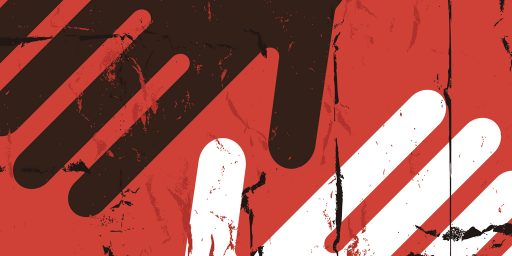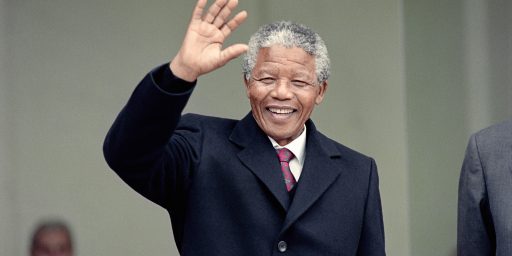South Africa Votes to Confiscate White-Owned Land
Under Nelson Mandela's leadership, the country made a smooth transition from apartheid. Now it's going the way of Zimbabwe.

South African President Cyril Ramaphosa speaks in parliament in Cape Town, South Africa, February 20, 2018. REUTERS/Sumaya Hisham
Once upon a time, South Africa received considerable attention in the American news media. The injustice of the apartheid regime and an American boycott movement received steady coverage in the 1980s and early 1990s. Nelson Mandela’s plight as a political prisoner and courage as the leader of post-apartheid transition made him an icon. But post-Mandela South Africa is slowly spiraling into another Zimbabwe.
The New Zealand Herald (“‘The time for reconciliation is over’: South Africa votes to confiscate white-owned land“):
South Africa’s parliament has voted in favour of a motion that will begin the process of amending the country’s Constitution to allow for the confiscation of white-owned land without compensation.
The motion was brought by Julius Malema, leader of the radical Marxist opposition party the Economic Freedom Fighters, and passed overwhelmingly by 241 votes to 83 against. The only parties who did not support the motion were the Democratic Alliance, Freedom Front Plus, Cope and the African Christian Democratic Party.
It was amended but supported by the ruling African National Congress and new president Cyril Ramaphosa, who made land expropriation a key pillar of his policy platform after taking over from ousted PM Jacob Zuma earlier this month.
“The time for reconciliation is over. Now is the time for justice,” Malema was quoted by News24 as telling parliament. “We must ensure that we restore the dignity of our people without compensating the criminals who stole our land.”
According to Bloomberg, a 2017 government audit found white people owned 72 per cent of farmland in South Africa.
ANC deputy chief whip Dorries Eunice Dlakude said the party “recognises that the current policy instruments, including the willing-buyer willing-seller policy and other provisions of Section 25 of the Constitution may be hindering effective land reform”.
ANC rural affairs minister Gugile Nkwinti added: “The ANC unequivocally supports the principle of land expropriation without compensation. There is no doubt about it, land shall be expropriated without compensation.”
Thandeka Mbabama from the Democatic Alliance party, which opposed the motion, said there was a need to right the wrongs of the past but expropriation “cannot be part of the solution”.
“By arguing for expropriation without compensation, the ANC has been gifted the perfect scapegoat to explain away its own failure,” she said in a statement.
“Making this argument lets the ANC off the hook on the real impediments — corruption, bad policy and chronic underfunding. Expropriation without compensation would severely undermine the national economy, only hurting poor black people even further.”
Pieter Groenewald, leader of the Freedom Front Plus party representing the white Afrikaner minority, asked what would happen to the land once it was expropriated.
“If you continue on this course, I can assure you there is going to be unforeseen consequences that is not in the interest of South Africa,” he said.
Cope leader Mosiuoa Lekota said there was a “danger that those who think equality in our lifetime equates that we must dominate whites”, News24 reported.
Malema has been leading calls for land confiscation, forcing the ANC to follow suit out of fear of losing the support of poorer black voters. In 2016, he told supporters he was “not calling for the slaughter of white people’ at least for now”.
That’s mighty white of him.*
Reuters is perhaps a bit more neutral in its report (“Vote in South Africa’s parliament moves land reform closer“):
South Africa took a step on Tuesday to hasten the transfer of land from white to black owners when parliament backed a motion seeking to change the constitution to allow land expropriation without compensation.
The ruling African National Congress has long promised reforms to redress racial disparities in land ownership and the subject remains highly emotive more than two decades after the end of apartheid. Whites still own most of South Africa’s land following centuries of brutal colonial dispossession.
Tuesday’s motion was brought by the radical left Economic Freedom Fighters (EFF) party but was supported by the ANC, which controls almost two-thirds of the parliament compared with EFF’s 6 percent.
South African President Cyril Ramaphosa said after his inauguration two weeks ago that he would speed up the transfer of land to black people although he stressed that food production and security must be preserved.
Launching a debate on the motion in parliament, EFF leader Julius Malema said”it was time for justice” on the land issue.
“We must ensure that we restore the dignity of our people without compensating the criminals who stole our land,” he said.
The motion was passed by 241 votes in favor versus 83 votes against. Parliament then instructed a committee to review the constitution and report back to it by Aug. 30.
It was not clear when any change to Section 25 of the constitution to allow expropriation of land without compensation would take place. Together, the ANC, EFF and other small opposition parties could muster the two-thirds majority needed for a constitutional change.
Something called the Zambian Observer has a more amusing take (“Take Me To Wakanda! South Africa Parliament Votes To Confiscate White-Owned Land Without Compensation“):
could South Africa be a real-life Wakanda?
South Africa is the middle of serious change. Earlier this month, President Jacob Zuma resigned from office after nearly nine years, ending a standoff with leaders in his own African National Congress party. A wealthy business man and close friend of Nelson Mandela, Cyril Ramaphosa is the new president.
Now, another change in South Africa — the South Africa parliament voted to confiscate White-owned landed with no compensation. News.com.au reports the vote will amend the country’s Constitution. “The motion was brought by Julius Malema, leader of the radical Marxist opposition party the Economic Freedom Fighters, and passed overwhelmingly by 241 votes to 83 against. The only parties who did not support the motion were the Democratic Alliance, Freedom Front Plus, Cope and the African Christian Democratic Party.” Malema said, “The time for reconciliation is over. Now is the time for justice. We must ensure that we restore the dignity of our people without compensating the criminals who stole our land.”
President Cyril Ramaphosa supports the amendment, saying, “We must see the process as accelerated land distribution, as an opportunity, rather as a threat. I’d like to invite all South Africans not to see this issue — this pain that many of our people our still going through — we should never see it as threat, we should rather see it as a great opportunity.”
Dave Schuler, from whom I got the pointer to the story, observes,
When I read this article I could only think of how nasty this could get. The white to black ratio in the population of Zimbabwe was never more than 1:20. In South Africa it’s more like 1:9. Also, the Afrikaners are very tough people and they arrived in South Africa at just about the same time as the Bantu-speaking people who make up 90% of blacks. Unless you think that blacks have some sort of inherent right to African land, a notion with troublesome implications, the Afrikaners have as much right to the land as the Bantu-speaking people do.
I agree with the sentiment, with a caveat. It’s absolutely true that South Africa is a unique case, in that whites have been there for centuries and the ancestors of present-day blacks living there came as migrants. The notion that the forebears of today’s white South Africans “stole the land” from the forebears of today’s black South Africans is mostly untrue. But, of course, the long history of apartheid was such that generations of blacks had little opportunity to become landowners. And that means, a generation after the end of apartheid, they’re still on the outside looking in despite being the overwhelming majority of the citizenry.
As a white man, I’m uncomfortable even trying to weigh the moral differences in the American and South African treatment of blacks. Slavery existed in both places, but started earlier and ended later here. Jim Crow was arguably less severe than apartheid but it lasted much longer; it also ended thirty years earlier.
We’ve been struggling for half a century to figure out how to mitigate the legacy of slavery and Jim Crow without much success. Various social welfare, educational, and affirmative action programs have helped but the progress has been quite slow. And there are still intelligent voices arguing that we need more radical solutions, including the payment of reparations.
But American blacks have always been a distinct minority. They were never more than 19 percent of the population, and that was in the very earliest days of the slave trade. In my lifetime—which coincides with the post-Jim Crow era—they have fluctuated between 10 and 14 percent. And they’re now not even the largest minority, having been overtaken by Hispanics. They’ve had little choice but to be relatively patient.
South African blacks, by contrast, are the overwhelming majority—much more so even than whites are here. The stark de jure repression there is much fresher. And their transition was accomplished as much by violent conflict as moral suasion. One at least understands why their patience has worn thin.
Still, Mandela succeeded where so many transitional leaders did not partly because he understood that the ideal outcome was a society that integrated the former oppressors. Like it or not, the whites had most of the money, technical training, and other assets necessary to remain a modern society. While that’s surely less true now than it was a quarter-century ago, neighboring Zimbabwe provides a cautionary tale against massive confiscation.
Indeed, there are already signs of a mass white exodus, with multiple petitions to grant expedited exile rights in the US and Europe:
Almost 12,000 people have signed a petition asking Donald Trump to allow white South African farmers to emigrate to the US after the country’s parliament passed a motion to explore amending the constitution to allow expropriation of land without compensation.
[…]
Following the vote, an online petition was started calling on President Trump to “initiate an emergency immigration plan allowing white Boers to come to the United States.”
The petition, which has been signed by 11,800 people, suggests that Trump should stop letting refugees from Somalia and countries in the Middle East enter the country, as they “cannot be properly vetted”, and should allow South Africans in instead.
“[They] can easily be vetted and also possess skills that make them compatible with our culture and civilization,” the petition states.
A similar petition, with over 17,000 signatures, is calling on Theresa May, Jean-Claude Juncker and Angela Merkel to “allow all white South Africans the right to return to Europe.”
There’s an irony in the latter in that, as with so many calls over centuries for blacks to “return” to Africa, most white South Africans have always been South Africans.
Balancing the legitimate concerns for justice here is well outside my zone of expertise. Some sort of public buyout program would seem an essential part of the package. For reasons already outlined, simply taking it from whites who inherited or even purchased the land legally would be not only unjust but destructive. But we can’t expect black South Africans to wait several generations to achieve a share of the economic pie commensurate with their population, either.
_________________
*Yes, I’m aware the phrase has racist origins. In this case, I think the double meaning makes it applicable.






South Africa was fortunate in that it was guided out of apartheid by men like Mandela and de Klerk who strove to put revenge aside and create a nation where blacks and Afrikaaners could live side by side. Sadly, the (mostly) men who have followed in their footsteps have done much to undo that work.
If stuff like this goes forward, the future of South Africa could be quite bleak indeed.
It’s no accident that the article to which I linked appeared in New Zealand media. Most of New Zealand’s new immigrants are whites coming from South Africa, who form a substantial part of the New Zealand population.
One more thing: Afrikaner is not synonymous with white South Africans. When I use the term, I refer specifically to the mostly Dutch white South Africans who’ve lived there for ten generations.
@Dave Schuler: I must confess, I didn’t know that.
If the US is sending any foreign aid or trades with that country, then it should be stopped immediately. The UN should step in and apply sanctions.
What we can expect next are show trials and the white people will be locked up or killed.
Squeeze them.
We are very slightly changed
from the semi-apes who ranged India’s prehistoric clay,
Whoever drew the longest bow
ran his brother down you know,
As we run men down today.
For the sake of historical accuracy: It would appear both Dave and the OP are also unaware that the Coloured population significantly descends from the pre-Bantu population and Black =/= Bantu. The non-Bantu well preceded the Bantu (Zulu, Xhosa). It is also the case that the Bantu groups were quite well established in the inland areas when the Boers ‘trekked’ inland, so it is hardly inaccurate for them to see such lands as being conquered from them.
This quite leaves aside the issue of the 20th century expropriations.
Outside of the Cape, Dave and James implied points on the land are rather distortions.
That of course does not make this a good idea.
James or Dave: a question. Is this coming up in part to take attention away from the gross govt mismanagement that has lead to Day Zero with Capetown’s Water? Yes, I know climate change etc. But there little question that the local and national governments badly managed the situation, creating the conditions for such a sever shortage.
It is coming up at a moment of transition from the Zuma presidency and likely as a protective ANC measure on its hard-populist flank against Malema.
Cape is not ANC core territory, Cape Town is not the question here.
Zuma transition is the question.
It is, by the way, a Parliamentary motion. The first step in a long road.
What has happened so far is that a motion was passed in the National Assembly to begin the process of amending the constitution to allow for expropriation without compensation. That’s it. Like a first step in US Constitution amending, more of Populist Posturing value than real legal threat.
The proposed amendment needs considered by the RSA Constitutional Review Committee, followed by a draft for public comment. The support of 2/3 of the RSA National Assembly and six of nine provincial delegations in the RSA National Council of Provinces is further required. This before getting to proper legislation and regulations which will give effect to the constitutional amendment, never mind the inevitable legal challenges from other opposition parties and civil society, no matter what form this might take.
@Tyrell:
Then the UN needs to sanction the USA for starting a war of aggression against North Korea, based on the twittering of the Orange Dear Leader, if one is to piss one’s pants over preliminary populist posturing.
Slavery has existed since the beginning of mankind. I’d be careful of making fine distinctions. But I digress.
I have a number of S African friends. They moved here for obvious reasons. I even bought a company from S African ownership. They were selling for obvious reasons.
It’s not going well there. This will end very poorly. Very poorly.
James Joyner:
Is this a misleading headline? Is this a troubling headline? Is it true and fair? Read the accompanying story. Is the headline you chose to use a fair representattion as to what actually happened / may happen?
In the eleventy-billion times Rs passed resolutions to end the ACA during the Obama era, did you ever headline the story:
US Votes to Eliminate Health Care for Poor People?
They did that ~60 times from 2010 to 2016. It was never going to be implemented and they knew it and we all knew it too.
Does signaling to the base only exist in internal US politics and no where else?
Why did you post this story with this headline?
@de stijl: I’m not sure I understand your analogy. We have a presidential system; they have a parliamentary system. Republicans voting, by a narrow majority, to undo the signature legislation of a sitting Democratic president is posturing. A multi-party coalition, passing by an overwhelming supermajority, a platform that the newly-elected president campaigned on is perhaps posturing as well but it’s certainly more significant.
Yes, it still needs to pass another hurdle. But all indications are that it will.
@Guarneri:
You are morally loathsome.
@Guarneri:
I hope you did well with that purchase. Even if by the slightest chance your assertion was in the vaguest way “truthful” your stewardship over said alleged SA enterprise could only thrive if you deported yourself differently in that commercial situation that you cannot seem to do here:
Openness, conviviality, truthfulness, honesty, respect
@James Joyner:
I think I’m not seeing your point. How is one instance obvious meaningless posturing (US), but the other is posturing+ (SA)?
In no way do I have any insight into SA internal politics, but if what Lounsbury says is true:
then how substantially is it different than a “signal” vote that often happens here?
Is it becasue SA is a parliamentary democracy?
Is it because:
By that measure the Mexican Superwall and the Muslim Exclusion Act would be a done deal here in the US. One party controls the House, the Senate, has a majority of SCOTUS nominated judges, and the President. So whatever any high ranking R elected person or administrative person says is official policy – that we will undoubtedly pursue and this is not just posturing and not just red meat for the base, right?
@de stijl: @de stijl:
Your analogy makes no sense. The Wall hasn’t come close to getting enough votes to pass the Congress. The Confiscation measure passed overwhelmingly in the SA parliament. Yes, it needs to go through a Constitutional review and then get passed again by the same body by fewer votes than it’s already passed by. That’s more than posturing.
@Lounsbury:
I’m aware that when the Portuguese first set foot on the Cape in the 16th century there weren’t any Bantu-speaking people there—there were “pre-Bantu” people and those people have largely been supplanted by the Bantu-speaking population who came into South Africa from the north.
I’m also aware that South Africa has a sizeable “Coloured” population. That’s about the limit of my knowledge of them or their political views. I also know there’s a substantial Asian population, presumably primarily Indians. I don’t know much more about them or their politics, either.
@Tyrell: Using your standard we should also suspend all aid to Israel too, right? They’ve only spent the last 50 years stealing land from the Palestinians.
@James Joyner:
Mate, it has to pass a metric ton of extra hurdles, in the plural.
For the time being, your alarmist but fairly superficially informed hand-wringing is charming but vastly overdone. For the moment.
@Dave Schuler:
No in fact in the Cape Region there never was a Bantu speaking population.
It did have quite the substantial indigenous non-Bantu African – from which the Coloured substantially descend. The timing of the Bantu speaking intrusion and the extent to which it represented assimilation of the pre-Bantu is complicated.
In any case, the simplistic implication in earlier comments by James and yourself that somehow the Bantu are arrivals simultaneous to the Afrikaaners (or more properly the people who would become them) is misplaced and ahistorical. This leaving quite aside the timing of the Afrikaaner arrival inland – the trekboer – and rather more fundamental issue of the 19th-20th century land expropriations.
Given the long history of racialist distortion in the history of SA and racist land grab justification, dodgy assertions around the history on land really should be avoided.
Present facts and the present idiocy of lands issue rather suffice (for all that the alarmist hand-wringing is as of yet over done, not to pretend this is a positive thing in any way but a wee bit soon to be painting Zim pictures as of yet).
South Africa has learnt through its neighbour Zimbabwe on the dos’ and don’t s, i certainly advise South Africans to approach this whole issue at hand with caution, extra caution. Let’s not have blood spilling. How ready are the blacks in South Africa to takeup the land that will be given to them? Have they been psychologically prepared for this kind of giagantic step? Are they ready to feed and contribute into the bread basket of South Africa and export? It’s not time to turn away nor run for my white brothers, sit down and let’s reason for there is a solution, where a problem arises, always rememeber a solution is near by. My advice to my dear black brothers is that, go easy on this land reform and let equality prevail, share wisely, and let’s not be greedy.
I hope that this site does become a regular host to Breitbart level agitprop.
This headline is worrisome.
Oh, it’s worse than just forcibly taking farm land. The end goal is the removal of private land ownership. They’ll give you a lease. Of course, once you’ve done compensationless confiscation,
who would invest in real improvements to the “state” land? South Africa is getting in the express lane to Venezuela-status.
@JKB: Yes Malema, leader of split-off party, sanctioned by ANC, is a vile c*nt.
The fact he loves to rail on with Neo Marxist Neo Tiers Mondiste rhetoric does not mean his splinter-group party is setting policy, and the replacement of Zuma with a guy who actually became by all appearances a proper businessman rather suggests that the alarmist pants-wetting here with more than a strong whiff of the odour of racialist panic is as of yet, rather too early.
Should any measure get beyond mere Parliamentary motion into the actual adoption circuit, then you can start more well-founded hand-wringing.
It is worth adding to avoid ambiguity, Schuler’s statement in his post cited by James “Also, the Afrikaners are very tough people and they arrived in South Africa at just about the same time as the Bantu-speaking people who make up 90% of blacks. ” is flat out wrong and blindly repeats an old racist myth from the Apartheid era. It confuses the later Zulu southern-ward migration with the wider idea of the Bantu. Repeating Apartheid era racialist historical dezinformatsia is rather disappointing.
The Xhosa were in place in the upper inlands of South Africa by at least the Middle Ages. The Cape Colony indeed fought several early wars with them on the frontier in the 18th century, although indeed the first western side coastal contacts were with the Khoisan ethnic peoples in the 17th century, that does not in any way mean the Bantu language speaking Xhosa just arrived at the same time as the Europeans (although they were pushing slowly downward. The genetic and linguistic heritage of the Xhosa (clicks e.g.) show the centuries long assimilation of Khoisan.
In no way defending the Malemas and the like who could well bring disaster to South Africa, but having Schuler and James parroting old Apartheid dezinformatsia (although yes, in ignorance) is fairly unpleasant.
@JKB:
What was being proposed (nationalization of all land – withe-owned or black-owned – and replacement of private property by long-term leases) is not, in practice, a system similar to Hong Kong or Singapura?